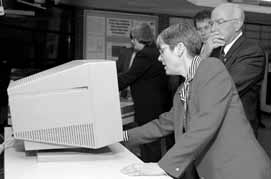 |
|
Deep Concers by Judy Jackson Ehlers Takes On Science Education
On November 8, Ehlers spoke on the House floor about the importance of science and math education. Excerpts from his remarks appear below:
"Mr. Speaker, I rise this evening to discuss the issue of education in mathematics and science in our Nation. I have deep concerns about the current status of math and science education in this Nation.... I believe currently it is inadequate. ... The Third International Mathematics and Science Study...indicated that we were near the bottom of those nations and developed countries teaching mathematics and science in their high schools....
"... With the resources that this country has and with the high quality of students this Nation has, it is inexcusable for us to be near the bottom.... We should be not only at the top, but far and away the best Nation in this world in terms of our educational effort. I think we have to improve our math and science education... We have to make sure we have enough scientists and engineers in this country so that we can keep our economic growth strong and meet the needs of our citizens....
"It is going to get worse. I have made predictions on this floor that in 20 years, it will be impossible to find a good job without a good foundation in math and science... It is clear to me that I have to revise my estimate downward and say in 10 years people will not be able to get a really good job without a good grounding in mathematics, science, engineering, and technology...
"How are we going to improve math and science education? ...We have to make sure we recruit good teachers, because we are not recruiting enough today, we have to make sure they are trained properly, and we have to keep them. We have to make sure they do not get discouraged. We have to help them get the job done in the classroom.
"We have to improve our science curricula. ... Recently the American Association for the Advancement of Science studied middle school curricula. Every middle school science curriculum in the United States was judged to be inadequate, every single one. The only one that was regarded as acceptable, and mildly acceptable, was one put out by Michigan State University....
"The final point is methodology. We have to improve...our methods of teaching science."
|
| last modified 1/14/2000 email Fermilab |
FRLsDFx9eyfrPXgV
 Accompanying Congressman Vern Ehlers on his visit to Fermilab was high-school physics teacher Michael Lach, son of Fermilab physicist Joe Lach. The younger Lach is spending a year as an Einstein Fellow on Ehlersís staff, in support of the congressmanís project to address problems in K-12 science and mathematics education. The House Republican leadership has asked Ehlers to conduct a comprehensive survey of U.S. science education. He plans to introduce a bill in early 2000 that will offer recommendations for improving teacher recruitment, preparation, use of technology and professional development.
Accompanying Congressman Vern Ehlers on his visit to Fermilab was high-school physics teacher Michael Lach, son of Fermilab physicist Joe Lach. The younger Lach is spending a year as an Einstein Fellow on Ehlersís staff, in support of the congressmanís project to address problems in K-12 science and mathematics education. The House Republican leadership has asked Ehlers to conduct a comprehensive survey of U.S. science education. He plans to introduce a bill in early 2000 that will offer recommendations for improving teacher recruitment, preparation, use of technology and professional development.